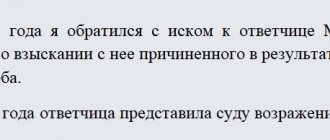A chapter on class actions was added to the Code of Civil Procedure. This is a new category of claims for civil litigation. They can be submitted, for example, by participants in shared construction to the developer, apartment owners to the management company, employees to the employer, and so on. This has made the process more convenient for citizens, since everyone will not have to participate in it and will not even need to issue a power of attorney. Such claims will also be beneficial for the court, since instead of dozens of typical cases they will consider only one. There are also disadvantages - the period for consideration of the case is four times longer.
The rules by which class actions should be filed and considered are set out in the material.
This opportunity is valid from October 1, 2021.
Four conditions for filing a class action lawsuit
A citizen or organization alone has the right to go to court to protect the rights and legitimate interests of a group of persons if the following conditions are met:
- there is a common defendant for all;
- the subject of the dispute is common or homogeneous rights and legitimate interests;
- the rights of group members are based on similar factual circumstances;
- all group members use the same method to protect their rights.
Members of a group of persons can be both citizens and organizations. In some cases specified in federal laws, bodies, organizations and citizens that are not members of this group may apply to protect the rights of a group of people.
Once a lawsuit is filed, at least 20 class members must join the lawsuit—this is the minimum number of participants for the court to consider the case.
You can join by submitting an application to join the claim (either or):
- to the plaintiff - before filing a claim;
- to the court - after filing the claim, but no later than the court proceeds to the debate.
An application for accession can be submitted (either or):
- in writing;
- in electronic form by filling out a form posted on the court’s website or in the Justice system.
Federal Law of July 18, 2019 No. 191-FZ “On Amendments to Certain Legislative Acts of the Russian Federation”
How to describe a dispute when preparing a claim for filing
The circumstances of the dispute in the statement of claim are stated in writing in any form. Events are described sequentially, starting from the first moment of the conflict situation. For example, on January 1, 2022, citizen Ivanov I.A. asked to lend him 10,000 rubles, pledging to return them by 02/01/2022. On February 15, 2022, I sent a written claim to the debtor, but did not receive a response. And so on.
Each situation must be described in as much detail as possible, indicating all the nuances relevant to the case. Events should be presented one by one. It is not necessary to indicate articles of laws. During the trial, the court will independently determine which rule of law needs to be applied. But pay attention to whether it is necessary to comply with the pre-trial procedure for resolving the dispute.
Requirements for a claim
A claim filed in defense of the rights and legitimate interests of a group of persons shall indicate:
1) the usual information that is indicated in the claim (Article 131 of the Code of Civil Procedure of the Russian Federation);
2) the person entrusted with the conduct of the case;
3) the rights and legitimate interests of the group of persons in whose defense the class action is being brought;
4) the circle of persons who are members of the group of persons and the grounds for such membership;
5) data of people who joined the claim:
- FULL NAME.;
- Date and place of birth;
- place of residence or stay;
- place of work or date and place of state registration as an individual entrepreneur;
6) if a member of the group is an organization - its name and address.
Attached to the claim:
- ordinary documents attached to the claim (Article 132 of the Code of Civil Procedure of the Russian Federation);
- statements by group members to join the claim;
- documents confirming membership in this group.
If the claim is filed by an authority, organization or citizen that is not a member of the group, then in the claim:
- there must be a reference to the law establishing the right of such a plaintiff to go to court;
- it must be indicated what exactly are the interests of members of a group of persons and what rights are violated.
A class action is filed in the court where the defendant is located (even if it is a consumer protection action).
Federal Law of July 18, 2019 No. 191-FZ “On Amendments to Certain Legislative Acts of the Russian Federation”
The procedure for filing a claim and the consequences of non-compliance
The initial stage of proceedings in the court of first instance is the initiation of a civil case. In this part of the process, the actions of interested parties and the judge are aimed at establishing the possibility of considering and resolving a civil case on its merits. By initiating a case, judicial protection of rights and freedoms is realized and guaranteed to everyone (Article 46 of the Constitution of the Russian Federation).
A civil case is initiated in court at the request of the persons listed in Art. 4 GPC. Claim proceedings are initiated by filing a statement of claim, and cases arising from public law relations and special proceedings are filed by statements. This chapter outlines primarily how to bring a claim by filing a claim in federal court and before a magistrate judge.
This procedure, constituting the general rules of civil proceedings, applies to non-claim cases, if the law does not provide for any exceptions (see Chapters 18 and 19 of this textbook).
Filing a claim is an application to the court for the protection of a specific subjective right or legitimate interest specified by an interested party. Legally, it represents a unilateral procedural expression of the will of the interested person, addressed to the court and aimed at initiating its activities to consider and resolve a dispute about the law.
For a judge to make a positive decision on accepting a statement of claim, it is necessary that the person applying to the court has the right to bring a specific claim (the right to go to court). Therefore, the judge must, first of all, check the existence of the prerequisites for this right (see § 3, Chapter 10 of this textbook).
The judge, having established that a person has the right to bring a claim (apply to court), must also check the correctness of the exercise of this right, i.e., compliance by the interested person with the procedure (conditions) for filing a claim (appeal to court).
These conditions are:
- the need for the plaintiff to confirm compliance with the pre-trial procedure for resolving the dispute, when this is provided for by federal law for this category of disputes or by agreement;
- jurisdiction of the case in this court;
- availability of the representative's authority to sign and submit a statement of claim to the court;
- the absence in the proceedings of this or another court, or an arbitration tribunal, of a case on a dispute between the same parties, on the same subject and on the same grounds;
- compliance with the form and content of the statement of claim (Article 131 of the Code of Civil Procedure);
- attachment to the application of the necessary documents (Article 132 of the Code of Civil Procedure).
Failure to comply with the procedure for filing a claim entails various procedural consequences depending on what conditions were not met by the interested party. Thus, failure to comply with the conditions specified in paragraphs 1–4 leads to the return of the application without consideration (Article 135 of the Civil Procedure Code), and in paragraphs 5, 6 - to leaving the application without progress (Article 136 of the Code of Civil Procedure).
Status of the person conducting the case
The person leading the class action case:
- must be a member of this group of persons. An exception is cases when, in situations specified by law, a body, organization or citizen that is not members of this group applies to protect the rights of a group of people.
- acts without a power of attorney on the basis of an application to join a claim to protect the rights of a group of persons;
- enjoys all procedural rights and bears all procedural obligations of the plaintiff, including the obligation to pay court costs. It is obliged to conscientiously protect the rights and legitimate interests of a group of persons. Unless otherwise provided by agreement of a group of persons, the person conducting the case has the right to entrust the conduct of the case to a representative.
- may be punished by the court by imposing a judicial fine in case of abuse of his procedural rights or in case of failure to fulfill his procedural duties, regardless of the assignment of the case to a representative;
- may lose his powers by terminating them by the court if the person refuses the claim or at the request of the majority of the plaintiffs, if it is discovered that the said person is unable to conduct business, including in the event of a long absence due to illness, vacation, study or being on a business trip or if there are reasonable doubts about his conduct of business reasonably and in good faith in the interests of a group of persons. In this case, the specified person must be replaced by another. Otherwise, the court will terminate the proceedings.
Federal Law of July 18, 2019 No. 191-FZ “On Amendments to Certain Legislative Acts of the Russian Federation”
Plaintiff
Some people still do not understand the difference between a plaintiff and a victim, and they also mistakenly confuse civil proceedings with criminal ones. Who is a plaintiff in court, types of plaintiffs, procedural rights and obligations of a plaintiff, who is an improper plaintiff, all this information is presented below.
The content of the article
:
Basic concepts of administrative law considered
- Who is a plaintiff (types, definition / concept) - Plaintiff definition - Civil plaintiff (plaintiff in civil proceedings) - Civil plaintiff (plaintiff in criminal proceedings, the so-called criminal plaintiff) - Administrative plaintiff (plaintiff in administrative proceedings) - Inappropriate plaintiff
- Rights and obligations of the plaintiff - Rights and obligations of the plaintiff in civil proceedings - Rights and obligations of the civil plaintiff in criminal proceedings - Rights and obligations of the plaintiff in administrative proceedings
- Information sources
Who is a plaintiff (types of definition/concept)
So who is the plaintiff? There are different interpretations of the term plaintiff, it all depends on what kind of legal process he is participating in, civil, criminal or administrative, in other words, on the type of plaintiff.
Plaintiff definition
First, let's expand on the concept of plaintiff in a general sense. The term "Plaintiff"
in short and in simple words, this is a person who applies to the court for the protection of his violated or disputed right, or interest protected by law.
Civil plaintiff (plaintiff in civil proceedings)
Now let’s expand on the concept of plaintiff in civil proceedings. This term is interpreted by the Code of Civil Procedure of the Russian Federation in Article 38 of the Parties. "Plaintiff"
- this is a person in whose interests the case was initiated at the request of persons applying to the court for the protection of the rights, freedoms and legitimate interests of other persons.
Civil plaintiff (plaintiff in criminal proceedings)
Now let’s expand on the concept of plaintiff in criminal proceedings (“criminal plaintiff”). This term of the Code of Criminal Procedure of the Russian Federation is interpreted in Article 44 of the Civil Plaintiff, and some mistakenly pronounce the term as a criminal plaintiff. Let's return to the term, so "Plaintiff"
- an individual or legal entity who has submitted a claim for compensation for property damage, if there are grounds to believe that this damage was caused to him directly by a crime.
Administrative plaintiff (plaintiff in administrative proceedings)
This term is interpreted by the CAS of the Russian Federation in Article 38 of the Parties. So "Plaintiff"
- a person who applied to the court in defense of his rights, freedoms, legitimate interests, or a person in whose interests the application was filed by a prosecutor, body exercising public powers, an official or a citizen, or a prosecutor, body exercising public powers, or an official who applied to the court to implement the control or other public functions assigned to them.
Inappropriate plaintiff
We will also define the term improper plaintiff. So "Inappropriate Plaintiff"
— An improper plaintiff is a person who does not have the right to claim a claim brought to court. We would like to note that the codes do not contain the concept of “improper plaintiff.” There is a person whose rights and legitimate interests have been violated, and who goes to court. Consequently, if the court finds that the rights and interests of the person in this case have not been violated, the court refuses to satisfy the claims.
Rights and obligations of the plaintiff
Rights and obligations of the plaintiff in civil proceedings
The plaintiff in civil proceedings has the right (the right):
- According to article Art. 35 of the Code of Civil Procedure of the Russian Federation, the plaintiff has the right to get acquainted with the case materials, make extracts from it, and make copies; challenge; present evidence and participate in its research; ask questions to other persons participating in the case, witnesses, experts and specialists; file petitions, including requests for evidence; give explanations to the court orally and in writing; present your arguments on all issues arising during the trial, object to the requests and arguments of other persons participating in the case; appeal court decisions; the plaintiff has the right to change the basis, subject and amount of the claim; the parties have the right to conclude the case by concluding a settlement agreement; and also use other procedural rights provided by the legislation on civil proceedings; submit documents to the court both on paper and in electronic form, including in the form of an electronic document signed with an electronic signature in the manner established by the legislation of the Russian Federation, fill out the form posted on the official website of the court on the Internet information and telecommunication network .
- An interested person has the right, in the manner established by the legislation on civil proceedings, to apply to the court for the protection of violated or disputed rights, freedoms or legitimate interests (Article 3, Part 1 of the Code of Civil Procedure of the Russian Federation).
- Persons participating in the case and who do not speak the language in which civil proceedings are conducted are explained and ensured the right to give explanations, conclusions, speak, submit petitions, file complaints in their native language or in any freely chosen language of communication, as well as use the services of an interpreter (Article 9 part 2 of the Code of Civil Procedure of the Russian Federation).
- Persons participating in the case and citizens present at an open court hearing have the right to record the progress of the trial in writing, as well as through audio recording. Photography, video recording, and broadcast of the court hearing on radio and television are permitted with the permission of the court. Article 10 part 7
- For the same reasons, a challenge may be filed by persons participating in the case, or considered on the initiative of the court. Article 19 part 1
- The choice between several courts, which, according to this article, has jurisdiction over the case, belongs to the plaintiff. Article 29 part 10
- The parties may, by agreement among themselves, change the territorial jurisdiction for a given case before the court accepts it for its proceedings. The jurisdiction established by Articles 26, 27 and 30 of this Code cannot be changed by agreement of the parties. Article 32
- The plaintiff has the right to change the basis or subject of the claim, increase or decrease the amount of the claim, or abandon the claim, the defendant has the right to admit the claim, and the parties can end the case with an amicable agreement. Article 39 part 1
- A claim may be brought to court jointly by several plaintiffs or against several defendants (procedural complicity) Article 40 part 1
- When preparing a case or during its trial in a court of first instance, the court may, at the request or with the consent of the plaintiff, allow the replacement of an inappropriate defendant with an appropriate one. Article 41 part 1
- Persons participating in the case who have reason to fear that presenting the evidence necessary for them will subsequently prove impossible or difficult may ask the court to secure this evidence. Article 64
- Each of the parties and other persons participating in the case has the right to present to the court issues to be resolved during the examination. The final range of issues on which an expert opinion is required is determined by the court. The court must provide reasons for rejecting the proposed questions. The parties and other persons participating in the case have the right to ask the court to order an examination at a specific forensic institution or to entrust it to a specific expert; challenge the expert; formulate questions for the expert; familiarize yourself with the court’s ruling on the appointment of an expert examination and the questions formulated therein; get acquainted with the expert’s opinion; petition the court to order a repeated, additional, comprehensive or commission examination. Article 79 part 2
- When preparing a case for trial, the plaintiff or his representative submits petitions to the judge to obtain evidence that he cannot obtain on his own without the help of the court. Article 149 part 1
- The plaintiff has the right to combine several related claims in one application. Article 151 part 1
- Persons participating in the case have the right to nominate a translator Article 162 part 1
- Persons participating in the case have the right to ask each other questions Article 174 part 1
- Persons participating in the case and their representatives have the right to petition for the disclosure of any part of the protocol, for the inclusion in the protocol of information about circumstances that they consider significant for the case. Article 230 part 2
- Persons participating in the case and their representatives have the right to familiarize themselves with the protocol within 5 days from the date of its signing and submit written comments on the protocol indicating any inaccuracies and (or) its incompleteness. Article 231
- A court decision in absentia can also be appealed by the parties in cassation, a magistrate judge's decision in absentia can be appealed on appeal within ten days after the expiration of the deadline for the defendant to file an application to cancel this court decision, and if such an application is filed - within ten days from the date of the court ruling refusing to satisfy this application. Article 237 part 2
- Decisions of magistrates may be appealed by the parties and other persons participating in the case to the appropriate district court through a magistrate. Article 320 part 1
- The person who filed the appeal has the right to refuse it in writing. Article 326
- The ruling of the magistrate may be appealed to the district court by the parties and other persons participating in the case, separately from the court decision Article 331
- Persons participating in the case have the right to submit objections in writing regarding the cassation appeal, presentation, with the attachment of documents confirming these objections. Article 334 part 1
- The person who filed a cassation appeal has the right to refuse it in writing in the cassation court before it makes the relevant court decision. Article 335 part 1
- The parties have the right to file motions to call and question additional witnesses and to request other evidence, the examination of which was denied to them by the court of first instance. Article 358 part 2
The plaintiff in civil proceedings is obliged to:
- Court decisions that have entered into legal force, as well as legal orders, demands, instructions, summonses and appeals from courts are mandatory for all state authorities, local governments, public associations, officials, citizens, organizations without exception and are subject to strict execution throughout the territory Russian Federation. Article 13 part 2
- Persons participating in the case must conscientiously use all their procedural rights. Article 35 part 1
- Persons participating in the case bear procedural responsibilities established by this Code and other federal laws. Failure to fulfill procedural obligations entails consequences provided for by the legislation on civil proceedings. Article 35 part 2
- Each party must prove the circumstances to which it refers as the basis for its claims and objections, unless otherwise provided by federal law. Article 56 part 1
- The price of the claim is indicated by the plaintiff. Article 92 part 2
- Persons participating in the case are required to inform the court about a change in their address during the proceedings. In the absence of such a message, a summons or other judicial notice is sent to the last place of residence or location of the addressee known to the court and is considered delivered, even if the addressee no longer lives or is located at this address. Article 118
- Compliance with the form and content of the statement of claim Article 131
- When preparing a case for trial, the plaintiff or his representative provides the defendant with copies of evidence substantiating the factual basis of the claim Article 149 part 1
- When judges enter the courtroom, everyone present in the courtroom stands up. The announcement of the court decision, as well as the announcement of the court ruling, which ends the case without making a decision, is heard by all those present in the courtroom standing. Article 158 part 1
- Participants in the process and all citizens present in the courtroom are obliged to comply with the established order in the court session Article 158 part 5
- Persons participating in the case are required to notify the court of the reasons for failure to appear and present evidence that these reasons are valid. Article 167 part 1
- The plaintiff's refusal of the claim or a settlement agreement between the parties, made after the acceptance of the cassation appeal or presentation, must be expressed in written applications submitted to the cassation court. Article 346
Rights and obligations of a civil plaintiff in criminal proceedings
According to Article 44 of the Code of Criminal Procedure of the Russian Federation, the plaintiff in criminal proceedings has the right (has the right):
- support a civil claim;
- present evidence;
- give explanations regarding the claim;
- file petitions and challenges;
- give evidence and explanations in his native language or a language he speaks;
- use the help of a translator for free;
- refuse to testify against yourself, your spouse and other close relatives, the circle of whom is determined by paragraph 4 of Article 5 of this Code. If a civil plaintiff agrees to testify, he must be warned that his testimony may be used as evidence in a criminal case, including in the event of his subsequent refusal to testify;
- have a representative;
- get acquainted with the protocols of investigative actions carried out with his participation;
- participate, with the permission of the investigator or inquiry officer, in investigative actions carried out at his request or at the request of his representative;
- abandon the civil claim brought against them. Before accepting the refusal of a civil claim, the inquirer, investigator, court explains to the civil plaintiff the consequences of abandoning a civil claim, provided for in part five of this article;
- at the end of the investigation, get acquainted with the materials of the criminal case related to the civil claim brought against him, and write out any information and in any volume from the criminal case;
- know about decisions made that affect his interests and receive copies of procedural decisions related to the civil claim brought against him;
- participate in the trial of a criminal case in the courts of the first, second, cassation and supervisory instances;
- speak in court arguments to substantiate a civil claim;
- get acquainted with the minutes of the court hearing and submit comments on it;
- bring complaints against the actions (inaction) and decisions of the inquiry officer, the head of the inquiry unit, the head of the inquiry body, the inquiry body, the investigator, the prosecutor and the court;
- appeal the verdict, ruling and ruling of the court insofar as it relates to the civil claim;
- know about the complaints and representations brought in the criminal case and file objections to them;
- participate in the judicial consideration of complaints and submissions brought in in the manner established by this Code;
- A waiver of a civil claim may be declared by a civil plaintiff at any time during the criminal proceedings, but before the court retires to the deliberation room to render a verdict.
The plaintiff in criminal proceedings is obliged to:
- to appear when summoned by an official (body) who is in charge of a criminal case or who is entrusted with carrying out a procedural action with the participation of a civil plaintiff (Code of Criminal Procedure of the Russian Federation Article 113);
- notify the investigator (inquiry officer, etc.), the court (judge) in advance about the reasons for failure to appear (Code of Criminal Procedure of the Russian Federation Article 188);
- do not knowingly give false testimony;
- do not refuse to testify, unless we are talking about information provided for in Art. 51 of the Constitution of the Russian Federation;
- bear responsibility for refusal to testify if the testimony does not concern himself, his spouse and (or) any of his close relatives, and for giving knowingly false testimony;
- not to disclose the data of the preliminary investigation if he was warned about this in advance in the manner prescribed by Art. 161 Code of Criminal Procedure of the Russian Federation;
- present, at the request of the investigator (inquiry officer, etc.), the court (judge), the documents at his disposal confirming or refuting certain circumstances related to the civil claim brought in his interests (Part 4 of Article 21 of the Code of Criminal Procedure of the Russian Federation);
- present, at the request of the court, written notes and (or) documents used by him during testimony (Article 279 of the Code of Criminal Procedure of the Russian Federation);
- maintain order at the court hearing (Article 257 of the Code of Criminal Procedure of the Russian Federation);
- obey the orders of the presiding officer (Article 258 of the Code of Criminal Procedure of the Russian Federation);
- comply with all other requirements of the criminal procedure law relating to the legal status of the civil plaintiff.
Rights and obligations of the plaintiff in administrative proceedings
In accordance with Art. 45, 46, 54, 207, 295, 298 CAS RF, an administrative plaintiff has the right (has the right):
- get acquainted with the materials of the administrative case, make extracts from them and make copies from them; challenge; present evidence, before the start of the trial, get acquainted with evidence presented by other persons participating in this case, and with evidence requested, including at the initiative of the court, participate in the study of evidence; ask questions to other participants in the trial; submit petitions, including the request for evidence, get acquainted with the protocol of the court session, the results of audio and (or) video recording of the court session, if such recording was carried out, and submit written comments to the protocol and regarding the results of audio and (or) video recording ; give explanations to the court orally and in writing; present your arguments on all issues arising during the trial; object to the requests and arguments of other persons participating in the case; know about complaints filed by other persons participating in the case, about judicial acts adopted in this administrative case and receive copies of judicial acts adopted in the form of a separate document; get acquainted with the dissenting opinion of the judge in the administrative case; appeal judicial acts insofar as they relate to their rights, freedoms and legitimate interests; enjoy other procedural rights provided by this Code (part 1 of article 45 CAS);
- submit information to the court in the form of electronic documents prepared by them or other persons, bodies, or organizations. Electronic documents are produced by the specified persons, bodies, organizations in the form established by the legislation of the Russian Federation, or in any form, if the production of such documents in the established form is not provided for by the legislation of the Russian Federation. An electronic document must be signed by the person (authorized official of the body, organization) who produced this document with an enhanced electronic signature, unless the legislation of the Russian Federation establishes a requirement for signing the produced electronic document with a different type of electronic signature (Part 3 of Article 45 of the CAS);
- An administrative plaintiff has the right, before the adoption of a judicial act that ends the consideration of an administrative case on the merits in the court of first instance, to change the basis or subject of the administrative claim (Part 1 of Article 46 of the CAS)
- An administrative plaintiff has the right, before the adoption of a judicial act that ends the consideration of an administrative case on the merits in a court of first instance or in a court of appeal, to abandon the administrative claim in whole or in part (Part 2 of Article 46 of the CAS);
- the parties have the right to enter into a reconciliation agreement in the manner provided for in Article 137 of this Code (Part 4 of Article 46 of the CAS);
- If this Code does not provide for the mandatory participation of a representative in the judicial process, citizens with administrative procedural capacity may conduct their administrative affairs in court in person and (or) through representatives. Personal participation in an administrative case of a citizen does not deprive him of the right to have a representative in this case (Part 1 of Article 54 of the CAS);
- persons participating in the case and their representatives have the right to familiarize themselves with the protocol of the court session, protocols of individual procedural actions, and records on storage media. Based on requests in writing and at the expense of the persons participating in the case, their representatives, a copy of the protocol, a copy of the recording from the storage medium can be made (Part 1 of Article 207 CAS);
- persons participating in the case and their representatives, within three days from the date of signing the protocol, have the right to submit to the court comments in writing on the protocol, indicating inaccuracies in it and (or) its incompleteness (Part 2 of Article 207 CAS);
- comments on the protocol submitted after the expiration of the specified period are not considered by the court and are returned to the person who presented them (Part 3 of Article 207 of the CAS);
- the right to appeal a court decision belongs to the persons participating in the case, as well as to persons who were not involved in the administrative case and whose rights and obligations were resolved by the court. The right to submit an appeal belongs to the prosecutor participating in the administrative case (Part 2 of Article 295 CAS);
- An appeal or presentation may be filed within one month from the date of the court decision in final form, unless other deadlines are established by this Code (Part 1 of Article 298 of the CAS).
In accordance with Art. 45, 62, 78, 101, 144 of the Code of Administrative Proceedings of the Russian Federation, the administrative plaintiff is obliged to:
- in cases provided for by the CAS of the Russian Federation, persons participating in the case are obliged to conduct business in court with the participation of representatives who meet the requirements provided for in Article 55 of this Code. If administrative cases in court are conducted with the participation of representatives, the persons participating in the case can determine the rights that the representatives exercise exclusively with their consent. Through their representatives, persons participating in the case can ask questions to other participants in the trial, give the necessary explanations, express opinions and perform other procedural actions. If necessary, the court has the right to involve directly persons participating in the case in the implementation of procedural rights (Part 5 of Article 45 of the CAS);
- must conscientiously use all procedural rights belonging to them (part 6 of article 45 CAS);
- dishonest application of an unfounded administrative claim, opposition, including systematic, by persons participating in the case to the correct and timely consideration and resolution of an administrative case, as well as abuse of procedural rights in other forms entails the consequences for these persons provided for by this Code (ch 7 Article 45 CAS);
- bear the procedural duties provided for by this Code, as well as the duties assigned to them by the court in accordance with this Code (Part 8 of Article 45 of the CAS);
- failure to fulfill procedural duties by persons participating in the case entails the consequences for these persons provided for by this Code (part 9 of article 45 CAS) - a court fine (clause 6 of part 2 of article 116 CAS) on a local government body, other bodies and organizations that are vested with individual state or other public powers - eighty thousand rubles, per organization - fifty thousand rubles, per official - thirty thousand rubles, per state or municipal employee - ten thousand rubles, per citizen - five thousand rubles (part 1 of article 122 CAS);
- persons participating in the case are required to prove the circumstances to which they refer as the basis for their claims or objections, unless a different procedure for distributing the responsibilities of proof in administrative cases is provided for by this Code (Part 1 of Article 62 of the CAS);
- if the examination is ordered at the request of a person participating in the case who is not exempt from paying amounts for conducting the examination, the ruling also indicates the obligation of this person to deposit, within the period established by the court, an amount of money into an account determined in accordance with Article 109 of this Code, payable to the expert, in the amount determined by the court on the basis of an agreement between the parties and the expert (part 4 of article 78 CAS);
- persons participating in the case are obliged to inform the court about the change of their address during the administrative proceedings. In the absence of such a message, a subpoena or other judicial notice is sent to the last place of residence or location of the addressee known to the court and is considered delivered, even if the addressee no longer lives or is located at this address (Article 101 CAS);
- participants in the trial and other citizens present in the courtroom are required to comply with the order established at the court hearing (Part 1 of Article 144 of the CAS).
Information sources
PravoDeystvie LLC, which provides legal assistance in Cheboksary, sincerely thanks the following sources for providing information about the plaintiff, civil, criminal and administrative, as well as the rights and obligations of the plaintiff: Documents of the Guarantor system; bookwu.net; isknaisk.ru; studfiles.net; sudrf.ru.
Rights of Class Members
A person who has joined the demand for the protection of the rights and legitimate interests of a group of persons has the right:
1) get acquainted with the case materials, make extracts from them and make copies;
2) petition the court to replace the person who is conducting the case in the interests of a group of persons, including after the adoption of a judicial act, which ends the consideration of the case on the merits;
3) be present at the court hearing, including if it is declared closed;
4) refuse the application submitted by him to join the class action.
Members of the group who do not agree with the demand presented have the right to enter into the case as third parties who do not make independent claims regarding the subject of the dispute.
Federal Law of July 18, 2019 No. 191-FZ “On Amendments to Certain Legislative Acts of the Russian Federation”
Measures to ensure a civil claim
The most important element of the pre-trial preparation of a civil claim in a criminal case is the adoption by the criminal prosecution authorities of measures to ensure a civil claim, including a possible one in the future. The judge has the right to take measures to secure an already filed civil claim on his own initiative in accordance with Art. 230 Code of Criminal Procedure of the Russian Federation. During pre-trial proceedings, the civil plaintiff and his representative have the right to petition the preliminary investigation body to take measures to ensure the filed civil claim. However, state criminal prosecution authorities (along with proving the grounds for a civil claim) are obliged to take measures to secure the claim on their own initiative.
Measures to secure a claim include operational search activities, investigative and other procedural actions aimed at discovering the property specified in Parts 1 and 3 of Art. 115 of the Code of Criminal Procedure of the Russian Federation. This property may be seized, which consists of making an inventory of the property and prohibiting the owner or holder of the property from disposing of and, if necessary, using it, as well as confiscating the property and transferring it for storage (Part 2 of Article 115 of the Code of Criminal Procedure of the Russian Federation).
The concept of “property” includes movable (including cash and securities) and immovable property. Seizure may be imposed on the property of: a) the suspect; b) the accused; c) persons bearing financial responsibility for their actions; d) other persons (if there is evidence that this property was obtained as a result of the criminal actions of the suspect or accused).
The procedural procedure for seizing property includes the prosecution filing a petition before the court to seize the property, and consideration by the court of the petition; seizure of property and its procedural registration.
Seizure of property is one of those procedural actions that can only be carried out by a court decision (Clause 9, Part 2, Article 29, Part 1, Articles 115, 165 of the Code of Criminal Procedure of the Russian Federation).
The investigator, with the consent of the head of the investigative body, as well as the interrogating officer, with the consent of the prosecutor, file a petition before the court to seize the property of the suspect, accused or persons who are legally liable for their actions. The decision to initiate a petition is accompanied by materials from the criminal case confirming the petition of the criminal prosecution body. The very procedural procedure for consideration by the court of a petition to seize property is provided for by the norms of Art. 165 Code of Criminal Procedure of the Russian Federation. Based on the results of consideration of the petition, the judge issues either a decision to seize the property or a decision to refuse to satisfy the petition.
Seizure cannot be imposed on property that cannot be foreclosed on in accordance with the Civil Procedure Code of the Russian Federation.
A court decision to seize property is executed by the criminal prosecution body, which may involve a bailiff or specialist. Seizure of property is carried out in the presence of witnesses.
General requirements for the procedural order of seizure are regulated by Art. 164 Code of Criminal Procedure of the Russian Federation. A protocol on the seizure of property must be drawn up. The protocol must reflect the following: by whom, when, where, from whom, what kind of property (if certificates, then which ones) was seized. The names of the items, their individual characteristics, price and quantity are described.
All disputes regarding the volume of seized property are outside the scope of not only this procedural action itself, but in general can be resolved outside the framework of this criminal case - in civil proceedings. In this case, the burden of proving their claims to exclude seized property from the inventory lies with the applicant.
The protocol is drawn up in at least three copies. The original is attached to the materials of the criminal case, the second is handed over to the person whose property was seized, the third copy is handed over to the person to whom the seized property is transferred for storage.
Property that has been seized is, at the discretion of the investigator, transferred for storage to: 1) the owner of the property or its owner; 2) to another person. They must be warned about the responsibility for preserving property (Article 312 of the Criminal Code of the Russian Federation). This is recorded in the protocol of seizure of property (Part 6 of Article 115 of the Code of Criminal Procedure of the Russian Federation).
If necessary, the seized property must be confiscated. The body conducting the investigation and seizing the property is itself obliged to store it until a court decision and bears responsibility for it.
When arrest is made on funds and other valuables belonging to a suspect, accused, located on an account, in deposits or in storage in banks and other credit institutions, transactions on this account are stopped in whole or in part within the limits of funds and other valuables that have been seized . The heads of banks and other credit organizations are obliged to provide information about these funds and other valuables at the request of the court, as well as an investigator or inquiry officer based on a court decision.
The seizure of real estate consists of an inventory of it, an announcement of a ban on its disposal, if necessary, restriction of the right to use the property, its seizure or transfer for storage. Seized real estate is transferred for storage against signature to the accused or other persons appointed by the investigator. When seizing real estate, the participation of a specialist - a real estate appraiser - is required to determine its value.
When seizing property, a protocol is drawn up in accordance with the requirements of Articles 166 and 167 of the Code of Criminal Procedure of the Russian Federation. If there is no property subject to seizure, this is indicated in the protocol. A copy of the protocol is given to the person whose property is seized.
The seizure of property is canceled on the basis of a resolution, determination of the person or body in charge of the criminal case, when the use of this measure is no longer necessary.
Procedure for consideration of cases
Class action cases are considered according to general rules, taking into account the following features.
The period for consideration of the case is 8 months (the usual period is 2 months).
The defendant in a class action is required to inform the court about the presence or absence of similar independent claims in other courts.
When a group member does not join the class action, but files his own separate one, the court explains to him the right to join the group:
- if he does this, the court makes an appropriate determination and transfers his claim to the court, which considers the class case.
- if he refuses, the court will suspend the proceedings in his case until the court decision on the class action comes into force. Moreover, this also applies to cases where an independent claim is filed before a group claim.
Federal Law of July 18, 2019 No. 191-FZ “On Amendments to Certain Legislative Acts of the Russian Federation”
Review procedure
When considering a civil claim simultaneously with a criminal act, there is always the danger of a debate about which code to follow. The procedure for material compensation and the basis for filing are determined by the provisions of the Criminal Code. It should be noted that answers to all unresolved questions that arise must be sought in the civil procedural code.
A civil applicant is allowed not to appear at the hearing, but only if he has no claims to a previously filed claim. Based on the results of the trial, the main requirement in the criminal case must be satisfied first (Article 458 of the Code of Criminal Procedure).
During the sentencing in a criminal case, the court decides whether it is possible to satisfy the filed civil claim, as well as all the parameters for the declared case:
- to whom compensation will be paid after the claim is satisfied;
- How much compensation will there be?
The issue of payment of material damage caused to the victim is also subject to clarification if no one has filed a petition for compensation. In proceedings on all these issues, the court is obliged to be guided by articles from the civil and sometimes labor code.
Both parties involved in the litigation can file a complaint against the verdict to the court of appeal or cassation. This is provided for in Article 354 of the Code of Criminal Procedure of the Russian Federation. It is also allowed to file other acts related to the case under consideration and directly related to the civil claim.
Preparing the case for trial
When preparing a class action case for trial, the judge:
1) determines the nature of the disputed legal relationship and the legislation to be applied;
2) clarifies the requirements for the protection of the rights and legitimate interests of a group of persons and the grounds for these requirements;
3) decides on the composition of a group of persons and the possibility of identifying other persons;
4) offers to provide evidence confirming that a particular person belongs to a group of persons;
5) invites the joining participants to conclude an agreement among themselves or to join a previously concluded such agreement;
6) performs ordinary actions in preparing the case for trial (Article 150 of the Code of Civil Procedure of the Russian Federation).
In the ruling on preparing the case for trial, the court sets a period within which the person leading the case must invite other persons from this group to join the class action. Such a proposal must be published in the media and can be posted on the court’s website or in the Justice system. If the proposal is not made within the time established by the court, the court leaves the claim without consideration.
Before the case is prepared for trial, the person conducting the case must provide the court with information about the persons who have joined the class action and submit documents confirming this.
A preliminary hearing in such cases is mandatory. During it, the judge decides whether a group of people meets the necessary conditions. Those who join are explained the right to go to court with independent claims if a group of persons does not meet the specified conditions.
Federal Law of July 18, 2019 No. 191-FZ “On Amendments to Certain Legislative Acts of the Russian Federation”
How to determine the defendant
The following may be held liable for the consequences of an atrocity indicated in a civil case:
- individuals;
- legal entities that caused losses to the applicant.
If the defendant is a minor at the time of the commission of the crime, then the guardians or parents will be held responsible. If there are none, then trustees. The legal capacity and degree of property liability of the punished person is regulated by law (Article 46 of the Criminal Procedure Code of the Russian Federation).
According to current legislation, the defendant has the right to have his claims declared invalid, that is, to withdraw them. This can be done during the course of the proceedings in this case. This must be done before the judge leaves for the conference room to take a guilty verdict.
If the court makes a decision to acquit the defendant, then the criminal case ceases to exist due to the lack of grounds for the claims. Accordingly, the civil claim under such circumstances remains unsatisfied. The accused has the right to protect his interests by filing a counterclaim and proving any inaccuracies.
Sometimes a criminal case is closed due to other circumstances: the statute of limitations has expired, the parties have made peace with each other, the action committed has ceased to be a danger to society, the defendant is unknown. In this case, the accused is still obliged to compensate the claimed damages.
Distribution of legal costs
A person conducting a case in a class action has the right to conclude an agreement in notarial form, which determines the procedure for its parties to bear legal expenses (a group agreement).
If the plaintiffs lose the case, then the court decides on the issue of reimbursement of the defendant’s legal expenses according to the general rules (Chapter 7 of the Code of Civil Procedure of the Russian Federation), after which it distributes the legal expenses in accordance with the said agreement.
If the plaintiffs win the case, then the court acts according to a similar algorithm, that is, it decides to reimburse the defendant for legal expenses, after which it distributes the reimbursed amount among the participants in accordance with the agreement.
Once such an agreement has been concluded, all demands for its modification or termination can only be brought in court.
Federal Law of July 18, 2019 No. 191-FZ “On Amendments to Certain Legislative Acts of the Russian Federation”
Class action decision
A decision in a case based on a class action is made according to the general rules (Chapter 16 of the Code of Civil Procedure of the Russian Federation).
The circumstances established by the court in such a case are not proven again when the court considers another case at the request of a member of this group of persons who has not previously joined the class action, unless they are disputed by this person.
The operative part of the decision must contain conclusions regarding each of the class members who joined the class action.
The court decision may indicate the defendant’s obligation to bring information about the decision to the attention of all members of the group of persons within the period established by the court through the media or in another way.
Federal Law of July 18, 2019 No. 191-FZ “On Amendments to Certain Legislative Acts of the Russian Federation”
Determination of the case
Having considered the application and attached documents, the court has the right to:
- Accept the claim;
- Reject the claim;
- Leave the matter without progress;
- Return the application to the plaintiff.
If everything is drawn up correctly and on time, clear and justified requirements are stated, the necessary and correctly executed documents are provided, the court accepts the claim and issues an appropriate ruling. On the basis of it, a case is initiated, during which the dispute between the plaintiff and the defendant will be resolved.
A statement left without progress presupposes the introduction of adjustments necessary for its further acceptance. The law specifies the conditions under which a claim may be rejected or returned to the plaintiff.
The difference between the new norms and the old ones
Part 4 of Art. is currently in force. 151 of the Code of Civil Procedure of the Russian Federation, which regulates class actions as follows: “The judge, having established that in the proceedings of this court there are several homogeneous cases in which the same parties are involved, or several cases on claims of one plaintiff against different defendants or different plaintiffs against one the defendant, taking into account the opinions of the parties, has the right to combine these cases into one proceeding for joint consideration and resolution, if he recognizes that such a merger will contribute to the correct and timely consideration and resolution of the case.”
| Aspect | The old way | In a new way |
| Combining the demands of several people into one thing | Right of court | Duty of the court |
| Criteria for combining requirements | Common defendant Similar cases | General defendant Homogeneous rights Same way to protect rights Similar factual circumstances |
| Possibility of combining claims filed in different courts into one case | Absent | Available |
| Jurisdiction when filing a class action lawsuit | At the location of the defendant, or at the place of residence of the plaintiff, or at the place of conclusion or execution of the contract, and so on | At the location of the defendant |
| Class action status | Each plaintiff represents himself or entrusts a representative to represent his interests | Only one representative acts on behalf of all participants in the case |
| Case consideration period | 2 months | 8 months |
| Prejudicial value of a decision in a class action | Not provided | Provided |
| Notification by the defendant of the court decision to the remaining members of the group | Not provided | Provided |
Please note that Federal Law No. 191-FZ dated July 18, 2019 does not affect the effect of Part 4 of Art. 151 Code of Civil Procedure of the Russian Federation. It does not repeal this norm or make changes to it. Therefore, it remained in effect after October 1, 2019 (the date of entry into force of Law No. 191-FZ).
However, taking into account the difference in regulation set out in the table, Part 4 of Art. 151 of the Code of Civil Procedure of the Russian Federation will not have to be applied in the part that overlaps with the new provisions.
Article by E.A. Prokazin, expert editor of the magazine “Time of an Accountant”
Similar amendments to the Arbitration Procedure Code of the Russian Federation
In the Arbitration Procedural Code, in contrast to the Code of Civil Procedure of the Russian Federation, separate rules for class actions were already provided for in a special chapter 28.2. Therefore, clarification amendments were made to it so that the provisions of the two codes in relation to this category of claims coincide.
For example, it was prescribed that claims for the protection of the rights and legitimate interests of a group of persons should be filed at the address of the defendant.
The same four criteria were indicated, in the presence of which the right to file such a claim arises: a common defendant, homogeneous rights, the same method of protecting rights and similar factual circumstances.
It has been clarified what data must be contained in an application submitted in defense of the rights and legitimate interests of a group of persons, including that it must indicate the person entrusted with the conduct of the relevant case.
They wrote that it was this person, and not the one who filed the application to the court, who acts on behalf of the entire group of persons without a power of attorney, enjoys all procedural rights and bears the procedural responsibilities of the plaintiff. The arbitration court has the right to impose a judicial fine on him and terminate his powers according to the same rules as under the Code of Civil Procedure of the Russian Federation.
Outlined the rights of persons who joined the demand for the protection of the rights and legitimate interests of a group of persons.
At the same time, the Arbitration Procedure Code of the Russian Federation will have rules that differ from the Code of Civil Procedure of the Russian Federation, taking into account the specifics of the cases under consideration.
Thus, in cases of corporate disputes on compensation for losses caused to a legal entity, on the invalidation of transactions of a legal entity, on appealing decisions of the management bodies of a legal entity, a member of the organization will have the right not to join the group claim, but to independently intervene in the case on the side of the plaintiff. In this case, such a participant enjoys procedural rights and bears the procedural responsibilities of the plaintiff.
If the participant does not agree with the stated demand, then he will have the right to enter into the case on the side of the defendant as a third party who does not make independent claims regarding the subject of the dispute.
Federal Law of July 18, 2019 No. 191-FZ “On Amendments to Certain Legislative Acts of the Russian Federation”
How a class action lawsuit helped dismantle an advertising structure
The owners of an apartment building in Bashkortostan, at an extraordinary meeting of owners, decided to terminate the agreement on the use of part of the common property of an apartment building with a municipal educational budgetary institution. They sent the institution a notification that the owners of the apartment building had made a decision to terminate it, but the budget institution never dismantled the advertising structure.
A resident of the building, on behalf of all the owners of apartments in the building, filed a claim with the institution to recognize the agreement for the use of part of the common property of the apartment building as terminated and to impose the obligation to dismantle the advertising structure placed. The plaintiff took advantage of Art. 244.20 Code of Civil Procedure of the Russian Federation on class actions.
The court upheld the claim and ordered the budgetary institution, within a month from the date the court decision entered into legal force, to dismantle the advertising structure from the end wall of the apartment building at its own expense.
Decision of the Ishimbay City Court of the Republic of Bashkortostan dated November 25, 2019 No. 2-1627/2019










